To engage younger people in voting the UK must provide far more integrated and accessible information about elections
The quality and accessibility of information about elections in the UK needs to be improved in order to enhance voter engagement, especially among young people, argue Democratic Audit’s Richard Berry and Patrick Dunleavy. In an extract from Democratic Audit’s new report, they discuss the weaknesses of existing sources of pre- and post-election information and, drawing on good practice overseas, consider what changes are required.
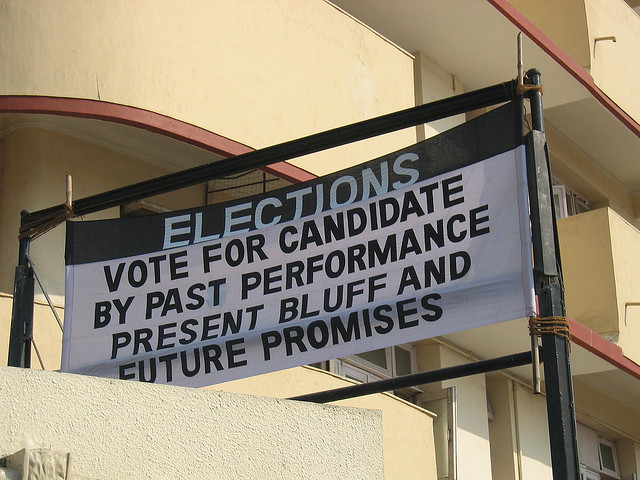
Do voters get the information they need before and after elections? Credit: Danny Birchall, CC BY-NC-SA 2.0)
Improved online resources about elections could play a vital role in reaching out to better engage young citizens. We know that young people are much more likely to access news online than older generations, and so accessing election information would be a natural progression. Online sources are also particularly suitable for a geographically mobile group who are least likely to be able to tap informal sources of information in the local community.
Upcoming elections
If we look at information given to voters online about upcoming elections (apart from by political parties) the UK has conspicuously weak provision compared with other countries. The Electoral Commission runs an About My Vote website that is supposed to give people this information, but it is very limited. For instance, in 13 February 2014 we entered a Westminster postcode into this site and received the message, “There are currently no elections planned in your area”. This information is misleading: the forward dates of the City of Westminster, European Parliament, Mayor of London, London Assembly and House of Commons elections for this area are all known, but not listed. Elections to Westminster borough and for London MEPS will take place on 22 May 2014, yet the Electoral Commission website is failing to inform voters about them.
Figure 1: About My Vote information on upcoming elections
www.aboutmyvote.co.uk screenshot after search for postcode WC2A 2AE, 13 February 2014. Highlight added.
Election results
The provision of information about election results in the UK is also unreliable. An extreme example was the Police and Crime Commissioner (PCC) elections in November 2012 across England and Wales. The official Home Office election website Choose My PCC provided very limited links to candidate’s websites before the election, with no attempt at presenting information in easy to use fashion. It then gave no information whatsoever on the numbers or shares of votes received by candidates after the election. Little wonder that turnout on this occasion was just 15 per cent.
In the past the BBC has been the best public-facing source for individual constituency results for some types of election, and it provides reasonable general election coverage. However, the BBC is providing a news service. While comprehensive information is provided about the national result and individual Westminster constituency results, there is no integration between different types of election. And BBC coverage online has sharply declined in recent years. A user could not, for instance, enter their postcode on the BBC and find out about other recent elections in their area (even though some useful information may get published for a while somewhere on the BBC website) or anything about upcoming elections. The same is true for the Electoral Commission website, which also has pages showing individual constituency results, but in less detail and with a less sophisticated search function.
Table 1 below looks at the major public and private sources of UK election results. Our analysis above shows the fragmentation of election results reporting in the UK.
Table 1: Online sources of election results
Shading: Blue indicates detailed results are available; red indicates postcode search is available. Further notes below.
Key problems with the provision of election results online are:
- Each type of election is currently reported in a different manner.
- Results reporting is fragmented across many different sources. Voters would need to have a PhD in British political science to know why one particular institution has a remit to publish particular results and others do not.
- There are no standard formats for the publication of results; variation occurs between different sources for the same election, and between types of election at the same source.
- Many different sources provide only summary results with no links to locally specific details that voters need to have about their ward or constituency area.
- Postcode search is not widely available, often requiring users to find the name of their ward or constituency (if known) by scrolling long lists. Of course, new residents and young people are least likely to know such highly esoteric names.
- Sources do not integrate different types of election so they are all easily accessible in one place; for instance someone inputting their postcode on the BBC would not bring up both the general election and the local election.
Local election results
Information about annual local elections is particularly poor, in two respects:
- There is no central source of ward-level election results. The BBC and other media outlets only publish summaries of results for each council, while the Electoral Commission does not publish any local election results. Citizens can only find out the results of a ward contest by visiting the website of their local council, and in many cases these sites are not user-friendly (some council only publish ward results by scanning a copy of the handwritten declaration form and posting it as a PDF).
- For councils with no majority party, it is very difficult for citizens to find out which party or parties are in power locally. Election results published by the BBC and other sources invariably list these councils as being under ‘No Overall Control’ (NOC). Very few councils that are NOC will provide clear information on their website about which parties have formed the Cabinet. Figure 2 shows an examples of this practice from the BBC.
Figure 2: BBC election result page for London Borough of Merton, 2010
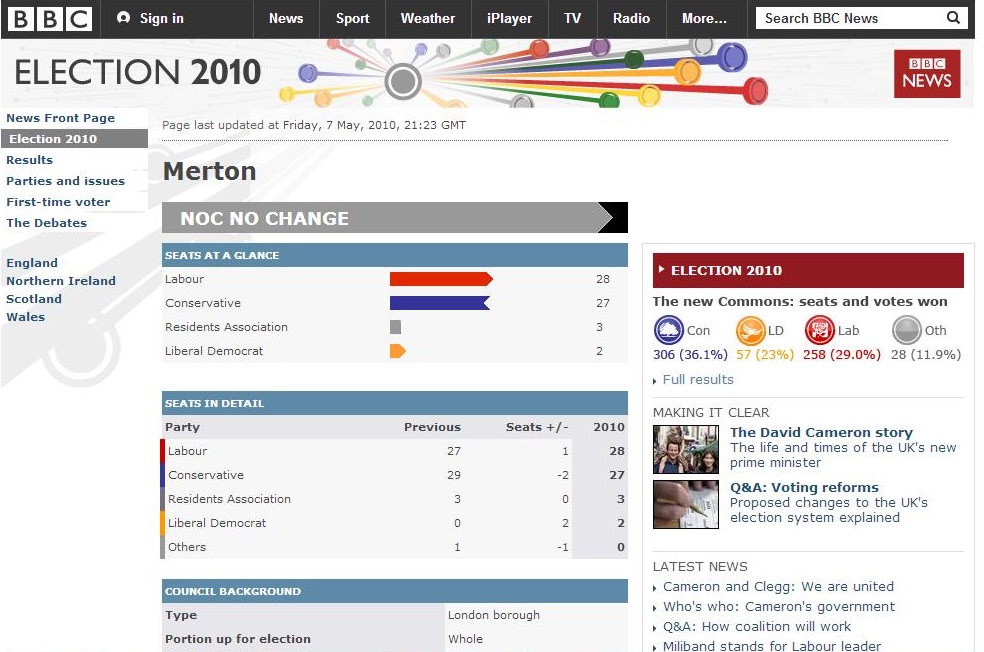
International comparisons
We have examined how other countries publish local election results centrally. There are a number of examples of much more detailed, local results being published by national or regional bodies in several:
- Ireland: the Department of the Environment, Community and Local Government document (PDF format) with a complete set of local election results for every local authority, including the votes for every candidate in every ward.
- India: the Election Commission publishes a spreadsheet with full results for every constituency in the 29 regional elections. This also indicated whether candidates were male or female.
- Australia: Regional bodies publish full results including every ward for local elections in their area. For instance the Western Australia Electoral Commission publishes webpages with results for over 100 local authorities, while the New South Wales Electoral Commission publishes results for about 150 local authorities in PDF documents.
- Bangladesh: the Election Commission publishes webpages with detailed results for three tiers of local government.
The importance of information
Most of us do not engage in behaviours where we are uncertain what is at stake, and where we get no feedback on our actions or participation after being involved. Yet UK central government and local authorities currently provide no easy access to information about who is standing at elections before voting takes place, and make very inadequate provision to inform voters about what happened in their specific ward or constituency as a result of their going to the polls. Yet, as Figure 3 shows, providing voter information and feedback is crucial in any democracy to encouraging and sustaining voting.
Figure 3: Voter information feedback loop
Opinion research has consistently indicated that information provided to UK voters is insufficient. Following the 2013 local elections, 53 per cent of voters and non-voters to an Electoral Commission survey said they knew ‘not very much’ or ‘nothing at all’ about the election. European Commission research has found that 83 per cent of UK citizens think that better information would increase turnout at European Parliament elections.
The information provided by public authorities has become particularly vital as local media outlets have declined. Recent research in Denmark has shown that coverage of local elections in the local media has a significant impact on voter turnout. However, in the UK the number of local newspapers and their overall levels of circulation have both been falling for many years, and are now at serious levels. The displacement of local newspapers by free sheets orientated only to advertising has had serious adverse impacts on local information provision.
Conclusions
Current arrangements in the UK only give very poor, fragmented and old-fashioned feedback to voters about what effect their participation has had, and what election outcomes were. Yet providing good information to voters before elections, and timely feedback afterwards on what happened, is fundamentally important for attracting and sustaining participation.
Different elections are publicised in very different ways and places, often after long delays. The poor online availability of election data in the UK is now something of a scandal. Taxpayers pay a lot for electoral administration and yet reporting standards and the provision of easy-access information to citizens are very uneven across the country.
More comprehensive and accessible online and digital sources of information need to be developed to reach all voters. Yet the need is especially urgent for younger voters in their 20s and 30s. Younger voters are more geographically mobile for university and work reasons, and through private renting. They are especially cut off from the diffuse local channels of political information that work better for older voters, who use public services more and are long established in a community. Improved provision could easily be implemented speedily and at low cost, in time for the 2015 general election.
—
This post is an edited extract from Democratic Audit’s new report, Engaging young voters with enhanced election information, based on our submission to the House of Commons Political and Constitutional Reform Committee inquiry into voter engagement.
Note: This post represents the views of the authors, and does not necessarily give the position of Democratic Audit or the LSE. Please read our comments policy before commenting. Shortlink for this post: buff.ly/1l1sS41
—
 Richard Berry is managing editor and researcher at Democratic Audit. His background is in public policy and political research, particularly in relation to local government. In previous roles Richard has worked for the London Assembly, JMC Partners and Ann Coffey MP. He is the author of the book Independent: The Rise of the Non-Aligned Politician (Imprint Academic, 2008). He tweets at @richard3berry.
Richard Berry is managing editor and researcher at Democratic Audit. His background is in public policy and political research, particularly in relation to local government. In previous roles Richard has worked for the London Assembly, JMC Partners and Ann Coffey MP. He is the author of the book Independent: The Rise of the Non-Aligned Politician (Imprint Academic, 2008). He tweets at @richard3berry.
 Patrick Dunleavy is the Co-Director of Democratic Audit, and Professor of Political Science at the London School of Economics (LSE). Patrick joined the LSE in 1989, and founded the Public Policy Group in 1992. He has published widely in a number of areas, including electoral systems and digital government. His most recent books are The Impact of Social Science (SAGE, 2014, with Jane Tinkler and Simon Bastow) and Growing the Productivity of Government Services (Edward Elgar, 2013, with Leandro Carrera). He tweets at @PJDunleavy.
Patrick Dunleavy is the Co-Director of Democratic Audit, and Professor of Political Science at the London School of Economics (LSE). Patrick joined the LSE in 1989, and founded the Public Policy Group in 1992. He has published widely in a number of areas, including electoral systems and digital government. His most recent books are The Impact of Social Science (SAGE, 2014, with Jane Tinkler and Simon Bastow) and Growing the Productivity of Government Services (Edward Elgar, 2013, with Leandro Carrera). He tweets at @PJDunleavy.
Notes from Table 1:
- The Electoral Commission publishes ‘electoral data’ for other elections, covering turnout, spoilt ballots, and so on.
- Local authority columns represent a general summary of practices. Individual council websites may differ.
- Some individuals have also published ward results on personal websites, with differing levels of comprehensiveness.
- The Guardian website has a map intended to show 2009 European Parliament election results, but it currently (21 February 2014) has no past results on it.

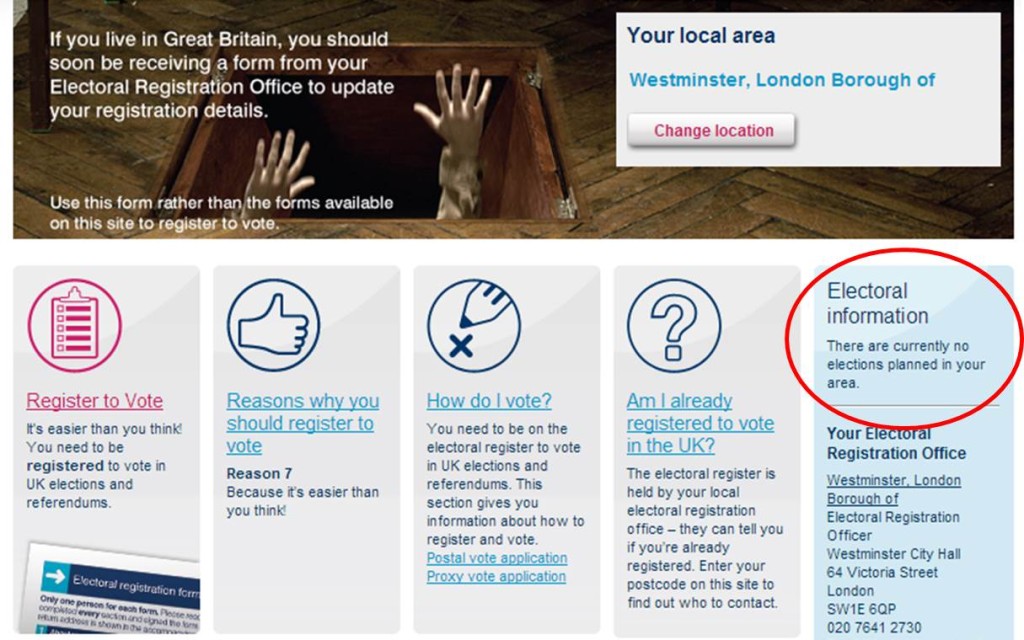
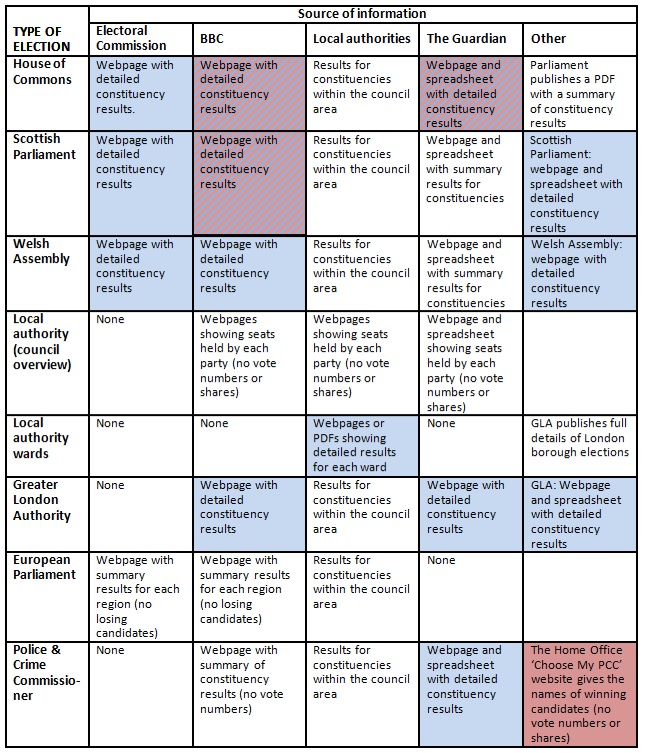
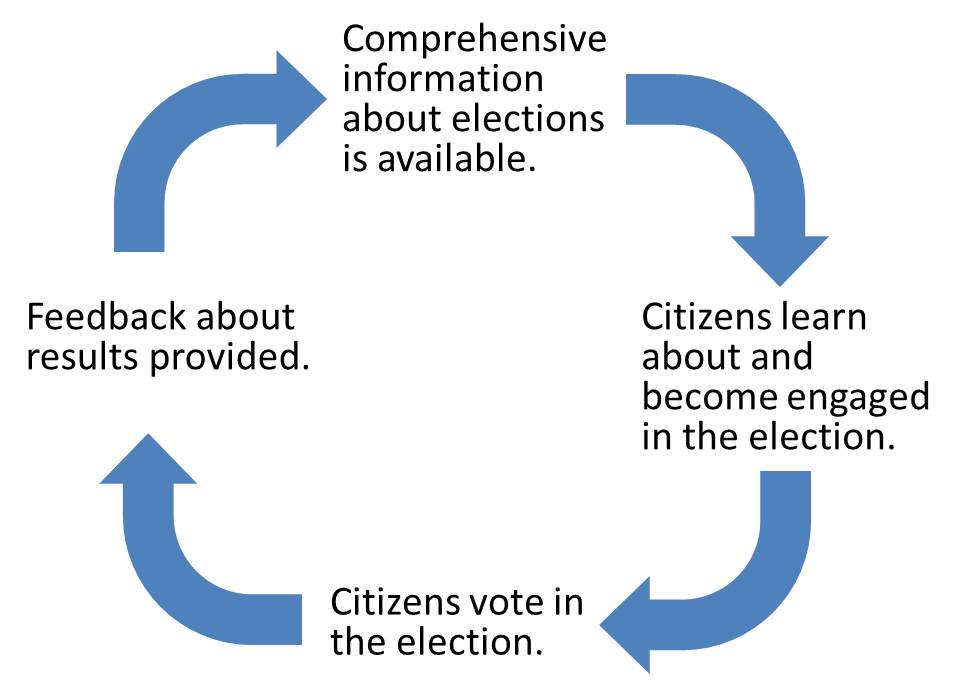
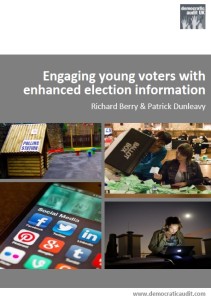




 Democratic Audit's core funding is provided by the Joseph Rowntree Charitable Trust. Additional funding is provided by the London School of Economics.
Democratic Audit's core funding is provided by the Joseph Rowntree Charitable Trust. Additional funding is provided by the London School of Economics.
.
благодарствую!
RT @richard3berry: New Democratic Audit report on engaging young voters with online election information, by me and @PJDunleavy. https://t.c…
New @democraticaudit report out today… how we’re still waiting for the digital revolution to happen in UK elections https://t.co/tFNkq83YmR
The publication of election results in the UK is fragmented, based on silos that make no sense to voters https://t.co/tFNkq83YmR
What information on elections is actually available in the UK? https://t.co/XWgxXSYbA9 https://t.co/INQpEyEmF0 @democraticaudit
UK election data availability ‘something of a scandal’ https://t.co/odCunZS6Qk | @democraticaudit report https://t.co/cyEQbWs8zt | #opendata
To engage young people in democracy the UK needs more comprehensive, integrated and accessible sources of inform… https://t.co/ntRef1HTDd
What information on elections is actually available in the UK? https://t.co/LjYwzjhKAT https://t.co/eGs2cfI8au
To engage young people in democracy UK needs more comprehensive, integrated, accessible sources of info on elections https://t.co/NttIKmmeW8
To engage young people in democracy UK needs better access to sources of info. about elections. @democraticaudit https://t.co/Jmk6Oft4lP
the UK needs more comprehensive, integrated and accessible sources of information about elections https://t.co/svNdPmWBeP
“@richard3berry New Democratic Audit report on engaging young voters with online election information, w @PJDunleavy https://t.co/FWNAQIDmaf
To engage younger people in voting the UK must provide far more integrated & accessible information about elections https://t.co/FWNAQIDmaf
Ever wondered why it’s so difficult to get accurate political information & why voters get confused . https://t.co/yuKnshBwTL
Want to find out the results of a local election? Good luck. https://t.co/tFNkq83YmR
RT @democraticaudit: We need more accessible, integrated sources of election information – new Democratic Audit report https://t.co/FgDofRST…
What do India, Ireland, Australia and Bangladesh all do that the UK does not? https://t.co/FgDofRSTUU (our new report on election data)
To engage young people in democracy the UK needs more comprehensive, integrated and accessible sources of… https://t.co/n8Ht4kQtDB